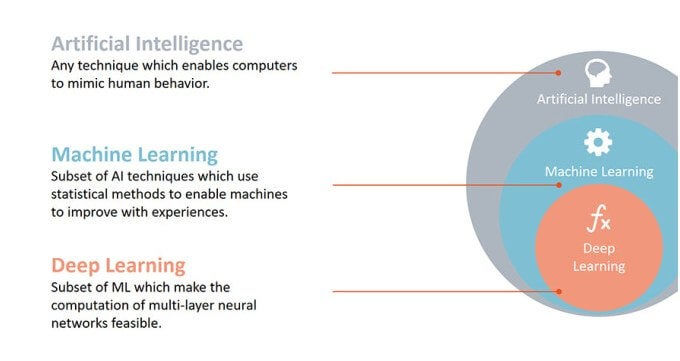Artificial Intelligence, or AI, is a term that has been widely used in the technology industry for years. It refers to the ability of machines to learn, reason, and perform tasks that would typically require human intelligence. The concept of AI has been around for decades, but recent advancements in technology have made it more accessible and applicable in various fields.
AI has become an increasingly important topic in today’s world, as it has the potential to revolutionize the way we live and work. From self-driving cars to personalized healthcare, AI has the power to make our lives easier, more efficient, and more enjoyable. However, as with any new technology, there are also concerns about the potential risks and ethical implications of AI. In this article, we will explore the definition of artificial intelligence and its implications for society.
Artificial intelligence (AI) refers to the ability of machines to perform tasks that typically require human intelligence, such as visual perception, speech recognition, decision-making, and language translation. AI is achieved by creating algorithms and computer programs that can process and analyze large amounts of data, learn from that data, and make predictions or decisions based on that learning. AI is used in a variety of industries, including healthcare, finance, and transportation, and has the potential to revolutionize the way we live and work.

Definition of Artificial Intelligence
Artificial intelligence (AI) is the ability of machines to perform tasks that typically require human intelligence, such as visual perception, speech recognition, decision-making, and language translation. AI systems are designed to learn from experience, adapt to new situations, and make decisions based on data. AI technologies are used in a wide range of applications, from self-driving cars and virtual personal assistants to healthcare and finance.
History of Artificial Intelligence
Artificial intelligence has been a topic of research since the early days of computing. The first AI programs were developed in the 1950s and 1960s, but progress was slow due to limited computing power and data. In the 1980s, AI research experienced a resurgence due to advances in machine learning and the availability of large amounts of data. Today, AI systems are becoming more sophisticated and are being used in a variety of industries.
One of the key breakthroughs in AI research was the development of neural networks, which are modeled after the structure of the human brain. Neural networks are used in many AI applications, including image recognition, language translation, and speech recognition. Another important development was the creation of machine learning algorithms, which allow AI systems to learn from data and improve their performance over time.
Types of Artificial Intelligence
There are several types of artificial intelligence, including:
1. Rule-based AI – This type of AI uses a set of rules to make decisions. For example, a spam filter might use a set of rules to determine whether an email is spam or not.
2. Machine learning – This type of AI uses algorithms to learn from data and improve its performance over time. For example, a recommendation engine might use machine learning to suggest products or services based on a user’s past behavior.
3. Deep learning – This type of AI uses neural networks to learn from large amounts of data. Deep learning is used in many applications, including image and speech recognition.
Benefits of Artificial Intelligence
Artificial intelligence has the potential to revolutionize many industries and improve our lives in countless ways. Some of the benefits of AI include:
1. Increased efficiency – AI systems can perform tasks faster and more accurately than humans, leading to increased productivity and cost savings.
2. Improved decision-making – AI systems can analyze data and make decisions based on that data, leading to better outcomes in many situations.
3. Personalization – AI systems can use data to provide personalized recommendations and experiences, such as personalized product recommendations or personalized healthcare.
Disadvantages of Artificial Intelligence
While there are many benefits to artificial intelligence, there are also some potential drawbacks. Some of the disadvantages of AI include:
1. Job displacement – AI systems have the potential to automate many jobs, leading to job loss in some industries.
2. Bias – AI systems can be biased if they are trained on biased data or if their algorithms are designed in a biased way.
3. Security risks – AI systems can be vulnerable to security threats, such as hacking or data breaches.
Artificial Intelligence vs. Human Intelligence
While AI systems can perform many tasks that require human intelligence, there are still some areas where humans excel. For example, humans are better at creative tasks that require imagination and innovation. Humans are also better at social interactions and emotional intelligence.
However, AI systems are better at tasks that require speed, accuracy, and data analysis. AI systems can also process and analyze large amounts of data more quickly than humans.
Applications of Artificial Intelligence
Artificial intelligence is used in a wide range of applications, including:
1. Healthcare – AI systems are used to analyze medical data and assist in diagnosis and treatment.
2. Finance – AI systems are used for fraud detection, risk assessment, and investment analysis.
3. Transportation – AI systems are used in self-driving cars and traffic management systems.
4. Education – AI systems are used in online learning platforms to provide personalized learning experiences.
The Future of Artificial Intelligence
As AI systems become more sophisticated and capable, they have the potential to transform many industries and improve our lives in countless ways. However, there are also some concerns about the impact of AI on society, such as job displacement and the potential for AI systems to be used for malicious purposes.
It will be important for policymakers, researchers, and industry leaders to work together to ensure that AI is developed and used in a responsible and ethical way, with a focus on maximizing the benefits and minimizing the risks.
Frequently Asked Questions
Artificial intelligence has been around for decades, but it’s only in recent years that it’s become a mainstream topic. Here, we answer some of the most frequently asked questions about AI.
What is artificial intelligence?
Artificial intelligence, or AI, refers to the simulation of human intelligence in machines that are programmed to learn and perform tasks that would normally require human intelligence to complete. This includes tasks such as problem-solving, decision-making, and understanding natural language.
AI can be broken down into two main categories: narrow or weak AI, which is designed to perform a specific task, and general or strong AI, which is designed to perform any intellectual task that a human can do.
What are the benefits of artificial intelligence?
There are many benefits to artificial intelligence, including increased efficiency and productivity, reduced errors and mistakes, and improved decision-making. AI can also help to save time and money by automating repetitive tasks, and it can be used to analyze large amounts of data to identify patterns and insights that humans may not be able to detect.
In addition, AI can be used in a wide range of industries, from healthcare and finance to transportation and agriculture, to improve processes and outcomes.
What are the risks of artificial intelligence?
While there are many benefits to artificial intelligence, there are also risks to consider. One of the biggest risks is the potential for AI to be used in ways that are harmful to humans, such as in autonomous weapons or in systems that discriminate against certain groups of people.
In addition, there is a risk that AI could lead to job loss and economic disruption, particularly in industries that rely heavily on manual labor. There is also a risk that AI could be used to spread misinformation or manipulate people’s behavior.
How is artificial intelligence used in everyday life?
Artificial intelligence is used in many everyday applications, from voice assistants like Siri and Alexa to personalized recommendations on streaming services like Netflix and Spotify. AI is also used in healthcare to help diagnose and treat diseases, and in transportation to improve safety and efficiency.
In addition, AI is used in finance to detect fraud and predict market trends, and in manufacturing to optimize production processes and reduce waste.
What is the future of artificial intelligence?
The future of artificial intelligence is exciting and full of potential. As AI continues to develop and improve, we can expect to see even more advanced applications in areas such as healthcare, education, and entertainment.
However, there are also concerns about the future of AI, particularly around issues such as privacy, ethics, and regulation. It will be important for society to work together to ensure that AI is developed and used in a responsible and ethical way.
In conclusion, artificial intelligence is a rapidly evolving technology that is transforming the way we live, work, and interact with the world around us. It encompasses a wide range of applications, from intelligent virtual assistants to advanced robotics and machine learning algorithms.
Despite its many benefits, however, AI also poses a number of challenges and ethical considerations that must be addressed in order to ensure its responsible and beneficial use. From concerns over job displacement and privacy to the potential for bias and discrimination, there is much to consider when it comes to the development and deployment of AI.
Ultimately, the definition of artificial intelligence will continue to evolve as the technology itself evolves and advances. As we continue to explore the possibilities of AI and its many applications, it will be important to remain mindful of the ethical and social implications of this powerful technology.

